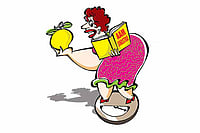So Mumbai’s best kept secret is not some nugget of Bollywood gossip but the knowledge that inside one of its most elite schools, 13-to 15-year-olds drank alcohol at a party. Tequila was smuggled in water bottles right under the noses of all the hi-tech security and CCTV cameras. I hope (fingers crossed) that you find this news disturbing. Not for the failure of CCTVs, but for our collective failure to educate children about sensible eating and drinking habits. Our kids have parents, families and family friends who “socially drink” and thereby make it aspirational and acceptable. The fact that an adolescent’s limbic areas of the brain, related to risk-taking, are better developed than the frontal lobe, which corresponds to responsibility, reasoning power and impulse control, never crosses our so-called mature and self-regulated, social drinking mind.
Moreover, kids don’t feel the immediate side-effects of alcohol: drowsiness or hangovers. Instead, the drug (yes, alcohol is one) produces “positive effects”, making it easier for them to interact at a school gathering and helping them overcome awkwardness. Many factors decide your child’s attitude towards alcohol—social acceptance of drinking is a big one. You can’t tell your teenager not to drink while sipping on wine or whisky yourself. Most school canteens don’t care if our children ate burger-chips or dal-chawal for lunch. Lawmakers happily allow alcohol advertisements disguised as soda or water promotions.
Who are we kidding? We need to grow up to this reality: kids who have exposure to drinking, even occasionally, are more likely to experiment with illegal drugs and—hope this gets your attention—score poor marks and retain little of what they learn in school.
(Nutritionist Rujuta Diwekar’s latest book is called Women and the Weight Loss Tamasha)


























